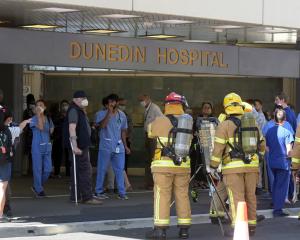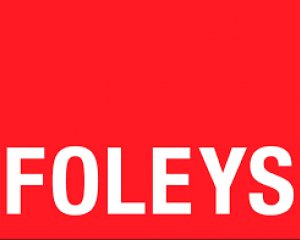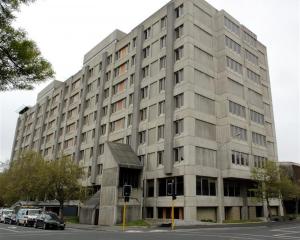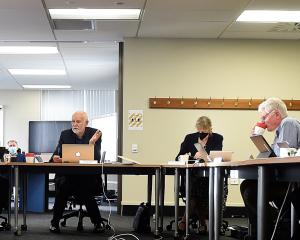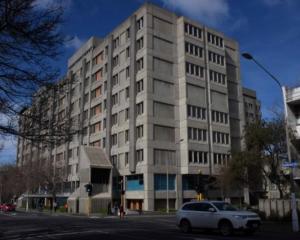At Southern District Health Board meetings, it has become a monthly ritual for board members to be updated on what is happening in the wake of a report last August revealing muddled leadership, poorly performing systems and demoralised staff.
Activities are assiduously ticked off by managers keen to show progress.
But is the DHB closer to achieving the sea change sought by the National Health Board (NHB), which spoke of a "long-standing disconnection" between the board and Dunedin Hospital clinicians?
And is there still a "culture of disempowerment" among staff at Dunedin Hospital, where managers took decisions in an "ad hoc" and "reactive" fashion, breeding uncertainty, inertia and frustration?
Streamlining surgical booking processes, improving Dunedin's troubled gastroenterology service, increasing day surgery rates, and establishing clinical pathways for the top 10 emergency department conditions, are examples of NHB recommendations either completed or "on track".
In a key area of NHB concern, radiology, the DHB admits there is too little progress, with unacceptably long waiting times for CT and MRI scans "being investigated".
There is a sense the real measures are yet to taken, as new broom chief executive Carole Heatly hits her stride after more than four months in the role.
The board is relying on Ms Heatly to reshape the district health board into a functional entity with happier staff, and a healthy set of books, with as little fallout as possible.
A source, who would not be named, said there would be "blood on the carpet" when Ms Heatly finished, a notion the former emergency department nurse and National Health Service chief firmly rejects.
She points out it would serve no purpose to cut through the DHB with a "slash and burn" ethos.
Being more efficient just might mean fewer staff, but was not her primary objective, she was keen to point out.
"I think you only get blood on the carpet when people do things without explaining what they're doing and don't give the reasons why."
And her first foray into restructuring, completed recently at the executive management level, was hardly ruthless, trimming the top team by just two members, from 13 to 11.
The Scotswoman, who until last year headed an NHS university hospital trust in northern England, has the outsider's perspective seen as crucial to cutting through vested interests.
It is hoped she can inspire clinicians to work for the DHB, "rather than see it as the enemy", the source said.
The NHS experience is viewed by board members as a positive, despite that organisation being criticised in Britain for inefficiency much more than New Zealand's health system.
Crucially, she is seen to lack the "us and them" mentality of some senior health managers, who blame "the centre" (Wellington) for difficulties.
One of the report's recommendations was appointing a chief executive who could inspire staff.
The NHB's involvement last year irked some managers and board members, who felt blamed for doing their best with limited funding.
The NHB blamed management's obsession with reducing the deficit for short-term thinking, poor decision-making, lack of proper planning, and strategy.
Then chief executive Brian Rousseau, who left for a job in Australia about a month after the report's release, slated a lack of government funding for the "soul-destroying" situation at Dunedin Hospital in a report released to the Otago Daily Times.
Mr Rousseau, who was chief executive for more than eight years, first of Otago, and later Southland, and Southern, announced his resignation in June 2011.
A long-standing issue for Mr Rousseau was concern the region is dealt with unfairly by population-based funding, the national system of health money allocation.
Board member Richard Thomson, who shared some of the concerns about the report's fairness, said when contacted it would be "ludicrous" to expect staff culture to change in a matter of months.
Fear over the deficit affected morale in Otago for years, and that was not going to change overnight, especially with the board facing yet another budget blowout.
The final 2011-12 deficit is still being calculated, but climbed yet again this month to as much as $15.5 million, well over the $10.17 million forecast.
A former chairman of the old Otago board, Mr Thomson is unusual among board members for being reasonably outspoken, both at meetings and when contacted by media.
Mr Thomson said the DHB's deficit problem was due to incessant pressure from Wellington to revise annual plans, leading to the DHB marking up unrealistic savings that were not realised.
While its "tone" had been unhelpful, the NHB report was a catalyst for change, and progress was being made, he said.
He is enthusiastic about the opportunities for combined clinical systems, meaning single waiting lists for treatments and procedures throughout Otago and Southland.
However, that shift risked masking individual problems at either Otago or Southland. A better standard of reports is considered crucial by Mr Thomson, who has complained at meetings about their lack of detail.
This is the subject of yet another workstream at the DHB, which is seeking to improve the quality and breadth of reports.
Mr Thomson said the Southern DHB must not be seen to have "one intelligent hospital [Dunedin] and one provincial [Southland] hospital": Dunedin Hospital had a lot to learn from Southland.
Southland had witnessed a turnaround in its financial and clinical performance, largely due to the role played by Mr Rousseau, and his deputy chief executive, Lexie O'Shea.
That the Southland-based Mrs O'Shea was appointed recently to the DHB's second-in-command role "gives the lie" to a perception Invercargill was the lesser part of the DHB equation.
The DHB would find it "bloody hard" to get rid of its deficit; Ms Heatly would need her "capable, personable, and tough" qualities to effect savings, having arrived to a "perfect storm" of problems.
Senior doctors' union executive director Ian Powell, of the Association of Salaried Medical Specialists, said little had been achieved since the NHB report.
Mr Powell, who was often highly critical of Mr Rousseau's leadership, said when contacted the DHB had been in a "period of hiatus" during the six-month gap between chief executives.
Ms Heatly faced a tough task of transforming the "disengaged" management culture she had inherited, which had a habit of talking down to people.
"Superimposed" on to a negative workplace, she engendered a "feel good" sense among those she met, and enjoyed enormous goodwill among staff.
However, the goodwill would dissipate if Ms Heatly did not effect some sort of turnaround, he suggested.
While Dunedin Hospital doctors were probably not much happier than when interviewed by the National Health Board panel last year, they were now hopeful, he said.
He sensed expectations hinged on a "Carole magic wand", but there were no magic wands, he cautioned.
He was also wary of following the NHS model, saying he was well connected in England, where plenty of doctors felt disconnected from their organisations.
Asked about the NHS comparison, Ms Heatly said she would take the best of the NHS, which included pushing higher productivity, and also take the lessons from its mistakes.
The pragmatic answer is typical of Ms Heatly, who is enthusiastic about the "huge" challenge ahead.
She was patient-focused, and to make the DHB perform as well as possible, she was embarking on the "nitty-gritty" work of the Otago and Southland merger.
She believed the NHB report's main legacy, so far at least, was making people realise the organisation had to be properly merged, rather than just share a letterhead.
"I think there was a lot of resistance to that ... I think there is a real recognition now."
Four and a-half months into the job, she was grateful to have started when people were ready for change.
"Rome wasn't built in a day, this isn't going to happen overnight ..."
Already, clinicians were moving around the DHB more to deliver services, rural hospitals were being better utilised, and the DHB was talking more to GPs, she said.
She thought staff were happier, judging from their level of engagement, but she was conducting a formal survey to find out.
"I'm sure it won't all be hearts and flowers ... but let's hear what they think."
Asked if being an outsider helped her get things done, she tactfully explained her "neutral" position allowed her to see things from all sides.
She admitted some people would not agree with the results of the restructuring.
While it says it is monitoring progress, the NHB appears to have taken the heat off the Southern DHB.
An Otago Daily Times request for a telephone interview with the NHB's DHB performance director, Michael Hundleby, was declined, but he issued a statement.
"Significant progress is being made in communicating the strategic direction of the DHB to staff and stakeholders.
"The structure of the executive team has been reviewed and work is progressing on aligning the structure of the rest of the organisation towards single clinical pathways and a more unified DHB."
Specific questions about individual areas should be directed to Ms Heatly, Mr Hundleby said.

